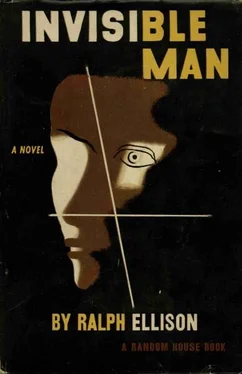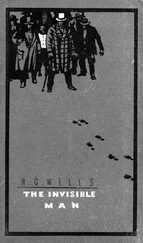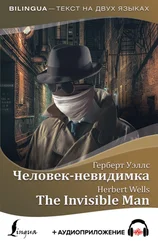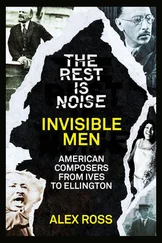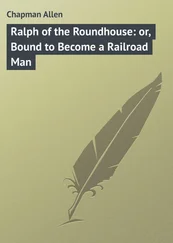Ralph Ellison - Invisible man
Здесь есть возможность читать онлайн «Ralph Ellison - Invisible man» весь текст электронной книги совершенно бесплатно (целиком полную версию без сокращений). В некоторых случаях можно слушать аудио, скачать через торрент в формате fb2 и присутствует краткое содержание. Год выпуска: 1995, ISBN: 1995, Издательство: Vintage Books, Жанр: Классическая проза, на английском языке. Описание произведения, (предисловие) а так же отзывы посетителей доступны на портале библиотеки ЛибКат.
- Название:Invisible man
- Автор:
- Издательство:Vintage Books
- Жанр:
- Год:1995
- ISBN:9780679732761
- Рейтинг книги:4 / 5. Голосов: 1
-
Избранное:Добавить в избранное
- Отзывы:
-
Ваша оценка:
- 80
- 1
- 2
- 3
- 4
- 5
Invisible man: краткое содержание, описание и аннотация
Предлагаем к чтению аннотацию, описание, краткое содержание или предисловие (зависит от того, что написал сам автор книги «Invisible man»). Если вы не нашли необходимую информацию о книге — напишите в комментариях, мы постараемся отыскать её.
The Waste Land,
Invisible man — читать онлайн бесплатно полную книгу (весь текст) целиком
Ниже представлен текст книги, разбитый по страницам. Система сохранения места последней прочитанной страницы, позволяет с удобством читать онлайн бесплатно книгу «Invisible man», без необходимости каждый раз заново искать на чём Вы остановились. Поставьте закладку, и сможете в любой момент перейти на страницу, на которой закончили чтение.
Интервал:
Закладка:
I spoke automatically and with such fervor that I did not realize that the men were still talking and laughing until my dry mouth, filling up with blood from the cut, almost strangled me. I coughed, wanting to stop and go to one of the tall brass, sand-filled spittoons to relieve myself, but a few of the men, especially the superintendent, were listening and I was afraid. So I gulped it down, blood, saliva and all, and continued. (What powers of endurance I had during those days! What enthusiasm! What a belief in the rightness of things!) I spoke even louder in spite of the pain. But still they talked and still they laughed, as though deaf with cotton in dirty ears. So I spoke with greater emotional emphasis. I closed my ears and swallowed blood until I was nauseated. The speech seemed a hundred times as long as before, but I could not leave out a single word. All had to be said, each memorized nuance considered, rendered. Nor was that all. Whenever I uttered a word of three or more syllables a group of voices would yell for me to repeat it. I used the phrase "social responsibility" and they yelled:
"What's that word you say, boy?"
"Social responsibility," I said.
"What?"
"Social ..."
"Louder."
"... responsibility."
"More!"
"Respon --"
"Repeat!"
"-- sibility."
The room filled with the uproar of laughter until, no doubt, distracted by having to gulp down my blood, I made a mistake and yelled a phrase I had often seen denounced in newspaper editorials, heard debated in private.
"Social ..."
"What?" they yelled.
"... equality --"
The laughter hung smokelike in the sudden stillness. I opened my eyes, puzzled. Sounds of displeasure filled the room. The M.C. rushed forward. They shouted hostile phrases at me. But I did not understand.
A small dry mustached man in the front row blared out, "Say that slowly, son!"
"What sir?"
"What you just said!"
"Social responsibility, sir," I said.
"You weren't being smart, were you, boy?" he said, not unkindly.
"No, sir!"
"You sure that about 'equality' was a mistake?"
"Oh, yes, sir," I said. "I was swallowing blood."
"Well, you had better speak more slowly so we can understand. We mean to do right by you, but you've got to know your place at all times. All right, now, go on with your speech."
I was afraid. I wanted to leave but I wanted also to speak and I was afraid they'd snatch me down.
"Thank you, sir," I said, beginning where I had left off, and having them ignore me as before.
Yet when I finished there was a thunderous applause. I was surprised to see the superintendent come forth with a package wrapped in white tissue paper, and, gesturing for quiet, address the men.
"Gentlemen, you see that I did not overpraise this boy. He makes a good speech and some day he'll lead his people in the proper paths. And I don't have to tell you that that is important in these days and times. This is a good, smart boy, and so to encourage him in the right direction, in the name of the Board of Education I wish to present him a prize in the form of this ..."
He paused, removing the tissue paper and revealing a gleaming calfskin brief case.
"... in the form of this first-class article from Shad Whitmore's shop."
"Boy," he said, addressing me, "take this prize and keep it well. Consider it a badge of office. Prize it. Keep developing as you are and some day it will be filled with important papers that will help shape the destiny of your people."
I was so moved that I could hardly express my thanks. A rope of bloody saliva forming a shape like an undiscovered continent drooled upon the leather and I wiped it quickly away. I felt an importance that I had never dreamed.
"Open it and see what's inside," I was told.
My fingers a-tremble, I complied, smelling the fresh leather and finding an official-looking document inside. It was a scholarship to the state college for Negroes. My eyes filled with tears and I ran awkwardly off the floor.
I was overjoyed; I did not even mind when I discovered that the gold pieces I had scrambled for were brass pocket tokens advertising a certain make of automobile.
When I reached home everyone was excited. Next day the neighbors came to congratulate me. I even felt safe from grandfather, whose deathbed curse usually spoiled my triumphs. I stood beneath his photograph with my brief case in hand and smiled triumphantly into his stolid black peasant's face. It was a face that fascinated me. The eyes seemed to follow everywhere I went.
That night I dreamed I was at a circus with him and that he refused to laugh at the clowns no matter what they did. Then later he told me to open my brief case and read what was inside and I did, finding an official envelope stamped with the state seal; and inside the envelope I found another and another, endlessly, and I thought I would fall of weariness. "Them's years," he said. "Now open that one." And I did and in it I found an engraved document containing a short message in letters of gold. "Read it," my grandfather said. "Out loud."
"To Whom It May Concern," I intoned. "Keep This Nigger-Boy Running."
I awoke with the old man's laughter ringing in my ears.
(It was a dream I was to remember and dream again for many years after. But at that time I had no insight into its meaning. First I had to attend college.)
Chapter 2
It was a beautiful college. The buildings were old and covered with vines and the roads gracefully winding, lined with hedges and wild roses that dazzled the eyes in the summer sun. Honeysuckle and purple wisteria hung heavy from the trees and white magnolias mixed with their scents in the bee-humming air. I've recalled it often, here in my hole: How the grass turned green in the springtime and how the mocking birds fluttered their tails and sang, how the moon shone down on the buildings, how the bell in the chapel tower rang out the precious short-lived hours; how the girls in bright summer dresses promenaded the grassy lawn. Many times, here at night, I've closed my eyes and walked along the forbidden road that winds past the girls' dormitories, past the hall with the clock in the tower, its windows warmly aglow, on down past the small white Home Economics practice cottage, whiter still in the moonlight, and on down the road with its sloping and turning, paralleling the black powerhouse with its engines droning earth-shaking rhythms in the dark, its windows red from the glow of the furnace, on to where the road became a bridge over a dry riverbed, tangled with brush and clinging vines; the bridge of rustic logs, made for trysting, but virginal and untested by lovers; on up the road, past the buildings, with the southern verandas half-a-city-block long, to the sudden forking, barren of buildings, birds, or grass, where the road turned off to the insane asylum.
I always come this far and open my eyes. The spell breaks and I try to re-see the rabbits, so tame through having never been hunted, that played in the hedges and along the road. And I see the purple and silver of thistle growing between the broken glass and sunheated stones, the ants moving nervously in single file, and I turn and retrace my steps and come back to the winding road past the hospital, where at night in certain wards the gay student nurses dispensed a far more precious thing than pills to lucky boys in the know; and I come to a stop at the chapel. And then it is suddenly winter, with the moon high above and the chimes in the steeple ringing and a sonorous choir of trombones rendering a Christmas carol; and over all is a quietness and an ache as though all the world were loneliness. And I stand and listen beneath the high-hung moon, hearing "A Mighty Fortress Is Our God," majestically mellow on four trombones, and then the organ. The sound floats over all, clear like the night, liquid, serene, and lonely. And I stand as for an answer and see in my mind's eye the cabins surrounded by empty fields beyond red clay roads, and beyond a certain road a river, sluggish and covered with algae more yellow than green in its stagnant stillness; past more empty fields, to the sun-shrunk shacks at the railroad crossing where the disabled veterans visited the whores, hobbling down the tracks on crutches and canes; sometimes pushing the legless, thighless one in a red wheelchair. And sometimes I listen to hear if music reaches that far, but recall only the drunken laughter of sad, sad whores. And I stand in the circle where three roads converge near the statue, where we drilled four-abreast down the smooth asphalt and pivoted and entered the chapel on Sundays, our uniforms pressed, shoes shined, minds laced up, eyes blind like those of robots to visitors and officials on the low, whitewashed reviewing stand.
Читать дальшеИнтервал:
Закладка:
Похожие книги на «Invisible man»
Представляем Вашему вниманию похожие книги на «Invisible man» списком для выбора. Мы отобрали схожую по названию и смыслу литературу в надежде предоставить читателям больше вариантов отыскать новые, интересные, ещё непрочитанные произведения.
Обсуждение, отзывы о книге «Invisible man» и просто собственные мнения читателей. Оставьте ваши комментарии, напишите, что Вы думаете о произведении, его смысле или главных героях. Укажите что конкретно понравилось, а что нет, и почему Вы так считаете.
